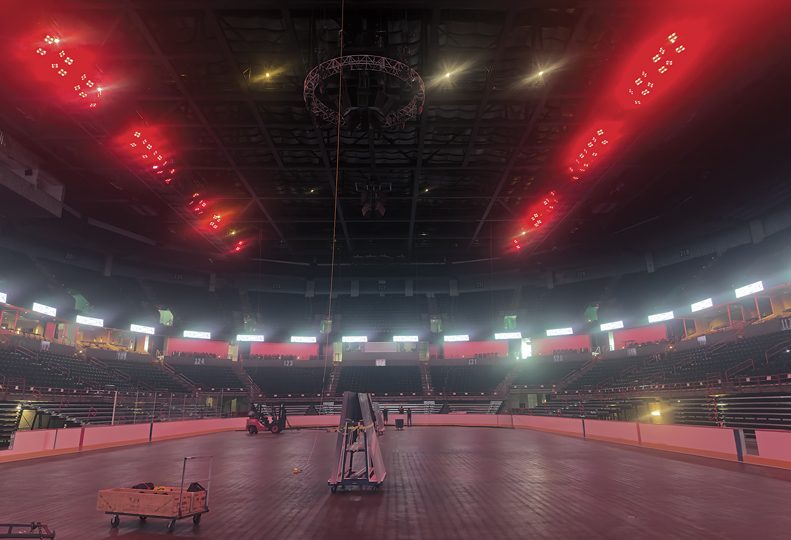PFD works to meet Clean Building Act standards
Arena lighting, ribbon board upgrades among district's recent projects

To help meet the requirements of the Clean Buildings Act, the Spokane Public Facilities District replaced the LED ribbon board and event lights at the Spokane Veterans Memorial Arena.
| Spokane Public Facilities DistrictOn top of its own self-imposed sustainability practices, Spokane Public Facilities District has spent the past two years working to meet upcoming deadlines for the state’s Clean Buildings Act.
The PFD operates Spokane Veterans Memorial Arena, the Spokane Convention Center, First Interstate Center for the Arts, The Podium Powered by STCU, and ONE Spokane Stadium.
“It’s been a burden and a financial hardship, but we’re happy to do it for the greater good,” says Stephanie Curran, CEO of the PFD.
The financial hardship Curran refers to stems from a number of projects that the PFD is completing to meet the criteria of the Clean Buildings Act, including the $1.1 million replacement of the LED ribbon board and the $420,000 replacement of the event lights at the arena.
The district also has set aside about $500,000 to upgrade the HVAC systems at the convention center and First Interstate Center for the Arts and currently is budgeting for the final LED light upgrades at the convention center.
“We’re happy to become more energy efficient, but we wouldn’t normally do all this in one year,” says Curran, explaining that projects of that magnitude typically would be spread out over the course of multiple years.
The Washington state Clean Buildings Act was signed into law in 2019, expanded in 2022, and augmented in 2023, with the intention of lowering costs and pollution from fossil fuel consumption in the state’s existing covered buildings, multifamily buildings, and campus district energy systems, according to the Washington state Department of Commerce website.
Under the law, nonresidential buildings, like those operated by the PFD, must meet yearly energy-efficiency compliance deadlines that begin in 2026. The deadlines differ based on a building’s square footage.
“Next June, they start calculating for the 2026 deadline,” says Melissa Coulter, purchasing manager for the PFD. “We have to be ready June 1 of 2025 because they track it for a year.”
The Podium and the stadium opened in 2021 and 2023, respectively, and already meet the energy-efficiency requirements, says Mike Gaffaney, director of facilities and operations at the PFD.
“The tough one is the Convention Center,” he says, noting that it was originally built in 1974 and has been expanded multiple times since then.
Engineering Economics Inc., the Denver-based facility consulting company working with the PFD, installed software into the convention center’s HVAC controls system that monitors energy efficiency and shows where improvements need to be made, Gaffaney says.
Given the high and relatively sudden cost of becoming compliant with the Clean Buildings Act criteria, the PFD requested financial assistance from the state last year.
“We worked with (Sen. Andy) Billig, and he was able to get us $3 million,” Curran says. “However, the money is coming out of the Climate Commitment Act funds, which is on the ballot to be repealed.”
If voters choose to repeal the Climate Commitment Act in November, the PFD would be on the hook for the money already spent or set aside for the energy-efficiency upgrade projects, Curran says.
“We’re still recovering from the COVID shutdown,” she adds. “We went a couple years without revenue, and then with limited tax revenue because of COVID. That’s why we’re seeking assistance.”
If the Climate Commitment Act remains intact, the PFD likely will see that funding next year.
In addition to the projects associated with the Clean Buildings Act, the PFD has its own self-imposed sustainability standards that it tries to adhere to.
“Our convention center was the second LEED-certified convention center in the country, I believe, back in 2007,” Curran contends. “We’re silver LEED-certified and we operate under those standards.”
Leadership in Energy and Environmental Design, or LEED, is a widely used green building rating system that provides a framework for healthy, highly efficient, and cost-saving green buildings, which offer environmental, social, and governance benefits, according to the U.S. Green Building Council website.
The sustainability goals listed on the PFD website show that the district tries to meet LEED standards regarding construction and renovations, indoor air quality, and water conservation.
The district also has sustainability standards for its purchasing strategies.
“We do have a pretty robust sustainability policy that, on the purchasing side, talks about locally produced products to help sustain and grow the local economy,” says Coulter.
The PFD partners with Chicago-based Levy Premium Foodservice Limited Partnership, which does business as Levy Restaurants, for all the food and drink services at its five facilities.
Levy Restaurants recently became EnviroCertified by the Spokane River Forum and other Spokane partners. The EnviroCertified program certifies businesses that put practices and policies in place to manage hazardous wastes properly and conserve resources.
About a year ago, Levy introduced a food-waste tracking system in order to reduce waste.
Over the past two years, 1,100 pounds, or 38%, of PFD food waste was distributed to people facing food insecurity, and 1,700 pounds, or 56%, went to a composting facility.
Coulter says it’s important for the PFD to continue implementing its sustainability practices.
“We want to be good practitioners and help the environment and take care of the world for future generations,” she says.





